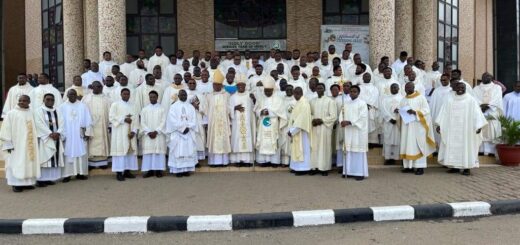LENTEN MESSAGE FOR 2017: FROM RENEWED INTERIOR LIFE TO LOVING BEYOND BORDERS
Most Rev. Ignatius A. Kaigama, Archbishop of Jos.
The period of Lent provides us an excellent opportunity once again to deepen our interior life, to do more good works, to seek forgiveness from God and to try to heal broken relationships. During this season, scripture readings remind us that those who return to the Lord even though they are torn to pieces by sin, he will heal them, bandage their wounds and bring them back to healthy spiritual life.
Baptized in Christ, we are a new creation. There is no longer Jew or Greek or Gentile, slave or free (cf. Gal 3:28). We need to show our newness in Christ concretely during Lent by our love for one another. If we say, “Jesus, we love you” but look down or discriminate against our brothers and sisters either on the basis of religion or tribe or the region where they come from, we are not loving with the unconditional love Jesus asks of us.
The beauty of Christianity is that it breaks down barriers, demolishes walls erected by ethnic or regional prejudices. If we welcome God but fail to welcome our brothers and sisters we are only Christians by half. When the rich young man asked Jesus how to gain eternal life, Jesus responded that it is by love of God and of neighbour (cf. Lk 18). St. John points out that if you say you love God but hate your brother or sister you are a liar (cf.1Jn 4:20) and St. James warns that if you see your brother or sister is hungry and say, “keep well and go in peace” without providing for him or her, you cannot be considered a good Christian (cf. James 2:16). We want to be fully Christians not half Christians. I urge that as you continue to work hard in and for the Church do remember that any human being you meet, be prepared to sacrifice your time, talent and resources to help.
A lot of work is being done to foster peace, to stamp out violence and ensure orderliness and brotherliness in different parts of Nigeria where today misunderstanding based on religious, ethnic or economic reasons cause us a lot of drawback. We need more genuine dialogue across ethnic, religious and political boundaries. The word “dialogue” thankfully has become a household word today. There was a time when even some highly placed religious leaders and political leaders saw those who spoke or promoted dialogue as compromisers. Teaching the young people to be hostile to their so-called enemies instead of the culture of dialogue has led some of our youths to readily resort to violence at the slightest provocation, which is why we witness inter and intra ethnic/religious violence. Parents must teach their children to be ambassadors of peace not war. The knives, swords, the bombs and guns have not brought victory to anyone. When we hear of youth from the North East, South East and the Niger Delta area threatening to destroy the economy, the unity and the corporate existence of this nation, the question is do they know the implications of war? Of all their boasting, no one has really won a war in this country. We are all losers after every war. Any war we fight will only take us back socially and economically to those dark days of survival of the fittest. We have experienced the sad effects of war and why try to go that way again? It is great that we have many NGOs today working for dialogue, reconciliation and peace. Let us keep talking to one another frequently, openly and sincerely and peace will come and remain.
Our Christian religion teaches us to care about others, overcoming evil with good (cf. Rom 12:21) The Good Samaritan is an example of loving beyond borders (cf. Lk 10). Phil 2:4 tells us to consider the interest of others first. In Luke’s gospel chapter 18:9-14 we read about the tax collector and the arrogant, boasting and self-centered Pharisee who went to pray. The lesson here is that Jesus does not want a self-centered Christian life. He wants us to be concerned about the spiritual and material welfare and salvation of all. If we do this well, we are evangelizing. Every baptized Christian is a missionary, sharing in the three-fold mission of Christ: prophet, priest and King. To be an effective missionary, we must experience the grace of conversion and have a personal encounter with the Lord Jesus and then we can contribute more meaningfully to the welfare of others.
The Lenten Season calls us to come back to the Lord God so that he will take all our iniquity away. We are invited to undergo interior change, to take a torch light and flash it on our hearts. We will be surprised what we may see there. We are not only called to spiritual conversion, but also to work for social and political transformation, to develop a better attitude to work, use of material resources and time and being sensitive to the needs of others especially the deprived and marginalized.
Why do we have many Churches springing up by the day and yet our society suffers so much social sickness? The simple reason is that many who profess religion are not religious. As with other religions, so also in Christianity one finds that some Christians are only nominal, some sit on the fence, some in the words of Fela, the late Afro musician, “follow follow”. Many are merely curious followers, uncommitted followers and very few are genuine disciples. The true disciples were with Jesus up to Calvary and carried on with his mission even with greater passion after his death. A true Christian is a disciple who makes the effort everyday to do what is pleasing to Christ. He prays often in the simplest terms: “Jesus, I love you,” not looking for visions or miracles. He does good works like Jesus, practises the corporal works of mercy and develops the habit of staying with Jesus ether at Mass or Eucharistic adoration or through works of charity with those in need by offering a helping hand like Simon of Cyrene helped carry the cross of Jesus.
We must all make a difference in the socio- political life of our nation. Faith and work must mix in a healthy way but not in a fanatical way like with those who try to promote religion but are insensitive to the common good. We are expected to witness about the goodness of our religions and to use the values of our religions to improve social services, but not to woo people, force people and intimidate them to join our religion. Conversion borne out of fear or coercion or the promise of material wealth is in fact ridiculing religion.
Our contemporary society polluted by social vices needs renewal. Sin is rationalized. Violence is institutionalized. May the Lord give us the grace to be active players in cleaning the face of our distorted, bloodied and corrupted society and may we all experience the mercy of God powerfully during this Lenten Season and beyond.




Lent is the favorable season for renewing our encounter with Christ, living in his word, in the sacraments and in our neighbor.
Other persons are a gift – Pope Francis amp;rsquo; Lenten message was released on Tuesday entitled amp;ldquo;The Word is a gift.